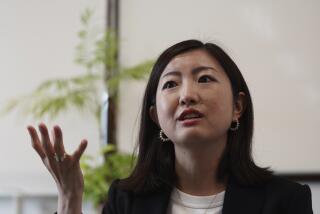In Japan, many now hope to dodge jury duty
- Share via
TOKYO — Jinko Takahashi stares with trepidation at the six oversized, black-cushioned chairs in a Yokohama District Court room.
The 49-year-old has just finished a four-hour program designed to prepare citizens for Japan’s new jury system.
Like many potential jurors across the world, Takahashi is not particularly enthused about her potential fate.
“To be completely honest, I don’t want to be on a jury,” Takahashi said, sighing.
In fact, she said, she showed up mainly to find out whether there was a way to avoid jury duty under the new law, which took effect last month.
“Coming here, I realized there’s no way out,” said Takahashi, a homemaker. “My kids are grown. I’m out of excuses.”
Japanese officials are working to allay the concerns of citizens as they begin calling on those 20 and older to serve on the new juries, or saibanin, on which citizens and judges will sit together.
Japan’s previous jury system was abolished during World War II and the new process, which will be used only for murder trials and other serious cases, is meant to make the justice system more accessible to the public.
But the move has brought several public protests. Many Japanese say the new system fails to treat everyone equally.
For example, they say, top politicians, legal professors, lawyers, prosecutors and judges are exempt from serving. Students, people 70 and older and those with serious illnesses or who care for the sick can also be excused.
The system, which resembles the formats in Germany and France, calls for six jurors to join three judges on each panel. Jurors can cross-examine witnesses; they deliberate in the same room with the judges, and their votes carry equal weight.
That gives pause to many here.
In a society governed by rigid rules of public politeness, they wonder if jurors will display the confidence needed to interact with, or challenge, the judges, particularly in closed-door murder deliberations.
“This is going to be a process where judges, who are experts of the law, are going to be mixed in with novices to deliberate,” said Takashi Maruta, a law professor at Kwansei Gakuin University.
Another potential stumbling block, some say, is that verdicts are based on majority rather than unanimous vote. Therefore, a juror who believes the accused is not guilty could nonetheless be asked to determine the sentence.
Since defendants plead guilty in 70% of the country’s indicted cases, much of the focus will be on sentencing. In Japan, those indicted are almost always found guilty. Japan convicts more than 99% of its criminal cases, compared with 89% in the U.S., statistics show.
“The conviction rate is high here because prosecutors only go after cases that would surely lead to convictions,” said Judge Masahiro Hiraki.
The percentage of citizens who do not want to participate in the jury system is almost as high. In an April poll by the Yomiuri Shimbun newspaper, 79.2% of those polled said they did not want to serve on a jury.
Nonetheless, the courts are well prepared for what is to come, Hiraki said. For five years, judges nationwide have been preparing to work with jurors, said Hiraki, councilor general of the criminal affairs bureau at the Supreme Court of Japan.
The training has included 630 mock trials and other public events. In Takahashi’s case, it included 80 minutes of deliberations on whether to sentence to jail a disgruntled worker who had committed arson after being laid off.
Whether the new system is ready or not, interest in it is high. TV networks have been airing dramas that involve such trials.
They’ve also been running Hollywood films with criminal jury scenes, including “A Few Good Men,” “Runaway Jury” and “A Time to Kill.”
--
Nagano is a special correspondent.
More to Read
Sign up for Essential California
The most important California stories and recommendations in your inbox every morning.
You may occasionally receive promotional content from the Los Angeles Times.













